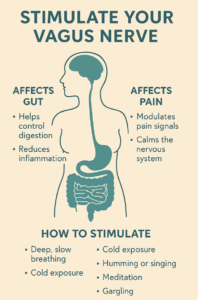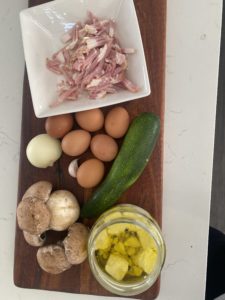Vagus Nerve Stimulation: The Key to Better Gut Health and Less Pain
Have you ever heard of the vagus nerve? It’s the longest cranial nerve in your body, running from your brainstem all the way to your gut, and it’s involved in so much more than you might think. From digestion and inflammation to your mood and even how you experience pain — the vagus nerve is kind of a big deal.
And the best part? You can actually stimulate it to support your gut health, reduce pain, and help your body find calm again.
Let’s explore how it works and what you can do to give your vagus nerve a healthy nudge.
What Is the Vagus Nerve?
The vagus nerve (pronounced “VAY-gus”) is like the superhighway of your parasympathetic nervous system — the “rest and digest” side of your nervous system. It sends messages between your brain, heart, lungs, and digestive tract, and plays a vital role in:
Slowing your heart rate
Regulating digestion
Managing inflammation
Helping your body recover from stress
When your vagus nerve is functioning well, you feel calmer, your digestion runs smoothly, and your pain levels may be more manageable. But when it’s not — things can feel a bit off.
The Vagus Nerve-Gut Connection
Ever felt butterflies in your stomach when you’re anxious? Or lost your appetite when you’re stressed? That’s your vagus nerve at work. It helps control the movement of food through your digestive tract and influences the production of stomach acid and digestive enzymes.
A sluggish vagus nerve can lead to:
Bloating
Constipation or IBS-like symptoms
Poor nutrient absorption
Increased gut inflammation
Stimulating your vagus nerve helps activate the parasympathetic state — which is where true digestion and healing happen.
Vagus Nerve and Chronic Pain
Research shows that a well-toned vagus nerve can actually reduce the perception of pain by calming the nervous system and reducing inflammation. This is especially important for those living with chronic conditions like fibromyalgia, autoimmune disease, or persistent gut issues.
When your body is constantly in fight-or-flight mode, pain signals can feel louder and more overwhelming. But when the vagus nerve is stimulated and functioning well, it can help dial that down and restore some balance.
Vagus Nerve Stimulation Naturally
Now for the fun part — here are some simple, science-backed ways to stimulate your vagus nerve and support your gut and nervous system:
1. Deep, Slow Breathing
Breathe in for 4, hold for 4, out for 6. Slowing your breath activates the vagus nerve and shifts your body out of stress mode.
2. Cold Exposure
Splash cold water on your face or finish your shower with 30 seconds of cool water. This gently stimulates the vagus nerve and boosts resilience.
3. Humming, Singing, or Chanting
The vagus nerve runs near your vocal cords, so humming or singing (in the car, shower, or anywhere!) can tone the nerve and create calm.
4. Gargling Water
Gargling stimulates muscles at the back of your throat connected to the vagus nerve. Do this daily for 30 seconds — you’ll feel silly, but it works!
5. Meditation and Mindfulness
Especially body scans or loving-kindness meditation. These practices activate the parasympathetic state and calm the nervous system.
6. Laughter and Social Connection
Spending time with people you feel safe with, laughing, or even watching something funny can stimulate the vagus nerve and lower stress hormones.
7. Probiotics and Gut-Supporting Foods
There’s emerging evidence that certain gut bacteria communicate directly with the vagus nerve. Nourishing your gut with fiber, prebiotics, and probiotics may help this connection flourish.
Final Thoughts
Your vagus nerve is like your body’s built-in switch for rest, recovery, and healing. When you nourish it — through breath, connection, nutrition, and mindful moments — you support your gut, reduce pain, and build resilience to stress.
If you’re navigating gut issues, chronic pain, or autoimmune conditions, working with your vagus nerve can be a powerful addition to your healing toolkit.
And as always, no pressure to do it all. Start small. One deep breath, one song you love to sing, or one mindful moment is a step in the right direction.

